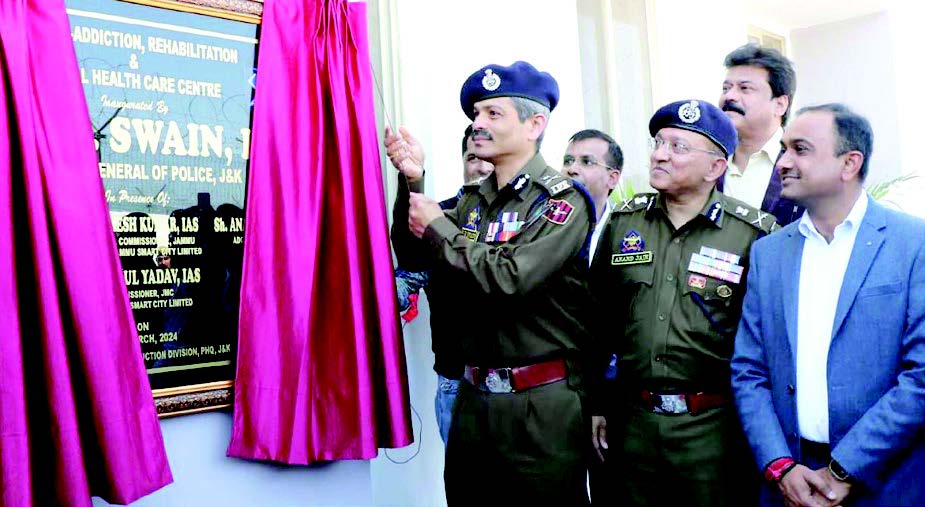Jammu, Mar 14: Director General of Police R R Swain Thursday said that the stratagem of “mutatis mutandis”, being used to tackle terrorism by striking on its ecosystem to eliminate it (terrorism) completely, would also be applied to contain narco-trade or narco-terrorism – evolving as major challenge in J&K.
He was responding to media queries after inaugurating the Drug-De Addiction and Mental Rehabilitation Centre at Channi Himmat.
DGP, while describing the narco-trade as a big challenge for J&K, given its status of border state, asserted that Jammu and Kashmir Police (JKP) was capable and determined to tackle this threat as well.
“The way we have dealt with the challenge of terrorism by dismantling the terror ecosystem; taking actions against not just the terrorists but their supporters, in any manner, under stringent UAPA to completely wipe out it (terrorism), has a visible impact. What we had done there – instead of totally focusing on the recruit, we focussed on those who helped him; who were provocateurs; those who helped in sheltering him, providing weapons or logistics. We identified all of them and started taking action. Same “mutatis mutandis” strategy (to change things which should be changed) will be adopted here (to tackle narco-trade),” he said.
“Our approach, more or less, would remain the same. Addict for us will be a victim. But we will take action against all those who would push him or help him in any way to become an addict. I believe, with time we should be able to succeed,” DGP exuded confidence.
Elaborating it further, he said, “It is important that the ‘tunnel’ will have to be dug from both sides. It means that it (problem) has to be addressed from both ends. We will have to launch double assault to tackle this menace.”
“There are two sides to it. One end is – demand and the other is the supply side. As far as supply side is concerned, the police were tackling it through coercive action, using law; arresting people involved in it, mainly drug dealers, who have turned it (drugs) into a business venture or an organized crime (syndicate). We are taking stricter action against them; resorting to property attachment as well. This aims at disincentivizing it (narco-trade). At the same time, action is warranted to stifle demand. However, this is very difficult and complex,” he said.
DGP Swain said that after Punjab, J&K was facing the challenge of the menace of drugs at a massive scale.
“Earlier cannabis was a homegrown challenge. Its consequences were limited. But now this challenge, with the entry of hard drugs like heroin and brown sugar, has emerged as a major challenge because its genesis is from across the border. The gravity of the challenge is that J&K is a border state, sharing Line of Control (LoC) and International Border (IB). This problem will not be there in Karnataka and Telangana. J&K is facing it because it has (shares) border with Pakistan in the West. Entire challenge comes from across the border as far as heroin and brown sugar are concerned. How grave this challenge is or how deep it is- analytical statistics are different. Nevertheless, we will not allow J&K to become Punjab,” he said.
With regard to a query about drug de-addiction centres, he said that there were ten centres, being operated by police. “There are private players as well. Challenge is that the demand for availing the services of de-addiction is large and this is insufficient to cater to that scale. Mostly, these facilities are at the district level,” Swain said.






